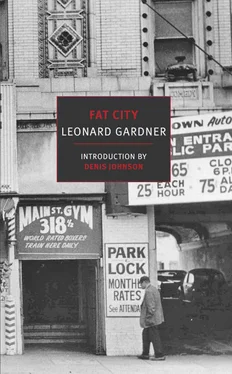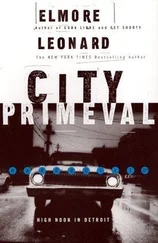Leonard Gardner - Fat City
Здесь есть возможность читать онлайн «Leonard Gardner - Fat City» весь текст электронной книги совершенно бесплатно (целиком полную версию без сокращений). В некоторых случаях можно слушать аудио, скачать через торрент в формате fb2 и присутствует краткое содержание. Год выпуска: 2015, Издательство: NYRB Classics, Жанр: Современная проза, на английском языке. Описание произведения, (предисловие) а так же отзывы посетителей доступны на портале библиотеки ЛибКат.
- Название:Fat City
- Автор:
- Издательство:NYRB Classics
- Жанр:
- Год:2015
- ISBN:нет данных
- Рейтинг книги:5 / 5. Голосов: 1
-
Избранное:Добавить в избранное
- Отзывы:
-
Ваша оценка:
- 100
- 1
- 2
- 3
- 4
- 5
Fat City: краткое содержание, описание и аннотация
Предлагаем к чтению аннотацию, описание, краткое содержание или предисловие (зависит от того, что написал сам автор книги «Fat City»). Если вы не нашли необходимую информацию о книге — напишите в комментариях, мы постараемся отыскать её.
Fat City — читать онлайн бесплатно полную книгу (весь текст) целиком
Ниже представлен текст книги, разбитый по страницам. Система сохранения места последней прочитанной страницы, позволяет с удобством читать онлайн бесплатно книгу «Fat City», без необходимости каждый раз заново искать на чём Вы остановились. Поставьте закладку, и сможете в любой момент перейти на страницу, на которой закончили чтение.
Интервал:
Закладка:
11
Wearing a new straw hat, Billy Tully crawled for seven days in the onion fields, then he was back on the dark morning street among crowds of men left behind by the buses, acridly awake with nothing to do at the impossible hour of 5 a.m. The men grumbled about workers from Mexico, talked of the canneries hiring, passed bottles, knelt in doorways for furtive games of crap, and in the blue light of dawn dwindled away, up Main and Market, along Center and El Dorado, back to the hotels, the lawn and shade of Washington Square, to Chinese and Mexican cafés and to the bars whose doors again were opening.
After reading the paper over coffee and eggs, Tully went back to his room, slept awhile on top of the covers, then took a bus across town. In a crowd of several hundred he stood in the sweet-sour stench of stewing peaches outside a cannery. Trucks passed laden with peach lugs and can-filled cartons. On a vast paved area behind a Cyclone fence, yellow forklifts were stacking lugs into piles the size of barns. Amid the hum of machinery, gleaming empty cans clattered constantly down a conveyor from a boxcar where a man was unstacking and feeding them to the belt with a wooden pitchfork. Blocking the steps to the office, an aged watchman armed with a billy club and a large revolver, his pants hiked above his belly and dewlaps quivering over his buttoned and tieless collar, warned the crowd to keep back from the building.
“Are you hiring or not?” Tully demanded, sweating and irritable now that the sun had cleared the roof.
“You’ll just have to wait and hear from them inside.”
“It don’t do them no good us standing here. Why can’t they come out and say if they don’t want us?”
“I wouldn’t know nothing about that.”
“Then let me go in and ask somebody.”
“Keep back. No one’s going in that office.”
“Why not? Who the hell you think you’re talking to?”
“I’m just doing what they told me. They told me don’t let nobody in the office and nobody’s going through that door as long as I’m here. It’s none of my doing.”
“They’re hiring all right,” said a man at Tully’s side. “I was out here yesterday and they said come back today.”
Tully pushed to the front of the crowd and stood with his hands on his hips to prevent anyone from pushing around him. One of the big corrugated steel doors was open; visible in the gloom of the cannery were lines of aproned women. Inside the doorway a forklift had set down a pallet stacked with full lugs, and now a man left the crowd, stepped into the doorway and came back with two peaches. Several men and women followed, returning with handfuls of fruit before the watchman arrived and took the peaches from one final, grinning, capitulating pilferer. At that moment two Negro women sat down on the office steps. The guard ran belligerently back, neck and pelvis forward, squared chin bony from the downward abandonment by its flesh. Arguing, the women rose, and his head turned from them to the open door, from which one more man slipped back to the crowd with a handful of peaches.
“Well, you old fart, are they hiring or not?” shouted Tully.
“Not your kind. You can go home right now.”
A whistle blew, the cans stopped rolling from the boxcar, the women inside the building left the line, and the office door was opened by a youthful, sober-faced man in a white short-sleeve shirt with a striped tie.
“The cannery won’t be hiring any more personnel at the present time,” he announced from the porch. “We’ve got our full crews for peaches. Come back when the tomatoes are ripe.”
A peach banged against the corrugated metal wall several yards to his side — a loud juiceless thump.
“Who did that?” shouted the watchman. He was answered with snickers. The man on the porch stated that throwing peaches would not get anybody a job, and he went back into the office. The crowd fragmented, people walking off down the sides of the street, some running to parked cars, some remaining in the yard as if not believing the announcement. Tully went over to the open cannery door.
“Not hiring!” yelled the watchman.
Nearby in the immense dim room, a girl in jeans and workshirt was seated on a pallet eating a sandwich, her neck round and sloping, with short black curls at the nape.
The watchman arrived wheezing. “Not hiring. Come back when the tomatoes are ripe. Don’t take any of that fruit.”
Tully took a peach and walked past him into the sunlight. The small chunk he managed to bite away he spit out. When he threw the peach against the front door of a house, it struck with the hardness of stone. Along the sides of the street green peaches lay in the weeds.
The next morning he went out with a busload of tomato thinners. It was a day haul he had many times been warned against, but it paid ninety cents an hour. There was no talk on the ride out of town. The men slept; those with seats to themselves lay down on them. By sunrise they were in the delta.
Preceded by another, the bus jolted down a dirt road to a field bordered by irrigation ditches. With a few groans but mostly in silence, the men climbed out into the sparkling air and selected short-handled hoes from the bed of a pickup truck. Then they jumped a ditch, a foreman already yelling on the other side, and they ranged over the field to continue the previous day’s weeding. Bent double, chopping with hoes half a yard long, crossing and uncrossing their legs, they stepped sideways along the rows.
Tully glanced around, saw what was being done, and began chopping, trying to leave an isolated tomato plant every width of a hoe blade. Engulfed by new weeds, grass and dandelion, they were seedlings growing in a double line down each row.
“What the hell kind of weeding you call that?”
Tully turned to a pair of legs in clean khaki. Straightening, he confronted a black mustache on a face he assumed, from its displeasure, was a foreman’s. Then he turned to the ground he had cleared: long, leafless gaps, interrupted by infrequent plants, several of which appeared now not to be tomatoes.
“Shape up and get your ass in gear or you can spend the day in the bus.”
“Tough shit. A lot I care. Big deal,” Tully whispered at the departing back, wanting to hurl his hoe at it. He stooped lower, gripped the handle closer to the blade and hacked on. Instead of spaced plants, for a yard of mounting anxiety he left nothing at all. Sliding his hand all the way down to the blade, he meticulously scraped around the next plant, cutting down grass and weeds in a closer and closer square, plucking with his free hand until the tomato with its two jagged leaves and an adjacent red-rooted weed stood alone; and then in one final minuscule nick both were down. Guiltily, he peered around before propping the tomato plant upright between two clods. Already his back was hurting. The pain began at his waist, spread down the backs of his thighs to the tendons behind the knee joints and up the spine to the shoulders and the back of the neck. A tractor came up his row pulling a disk harrow, and when Tully straightened and moved aside for it to roar past, plowing under the chopped weeds, tiny transparent specks quivered before his eyes. He was falling behind. Soon he was the last stooped man moving across the field, and the foreman, stepping in long strides over the rows, again came threatening dismissal. Tully chopped on with desperate imprecision, dismayed by the lowness of the sun, which seemed to hang stationary. He doubted his back could last, and it was not the loss of the money, a day-long wait or the hitchhiking back he feared. It was the disgrace, for all around him were oaths, moans, bellowed complaints, the brief tableaux of upright wincing men, hoes dangling, their hands on the small of their backs, who were going on under the same torment — some of them winos, donut and coffee men, chain smokers, white-bread eaters, maybe none ever athletes yet all moving steadily on while he fell farther and farther behind, hacking in panic over the desertion of his will. He could not resign himself to the inexorable day; he would have to quit, and the others, he felt, were fools in their enduring. Including himself, only three men out of two busloads were white.
Читать дальшеИнтервал:
Закладка:
Похожие книги на «Fat City»
Представляем Вашему вниманию похожие книги на «Fat City» списком для выбора. Мы отобрали схожую по названию и смыслу литературу в надежде предоставить читателям больше вариантов отыскать новые, интересные, ещё непрочитанные произведения.
Обсуждение, отзывы о книге «Fat City» и просто собственные мнения читателей. Оставьте ваши комментарии, напишите, что Вы думаете о произведении, его смысле или главных героях. Укажите что конкретно понравилось, а что нет, и почему Вы так считаете.












